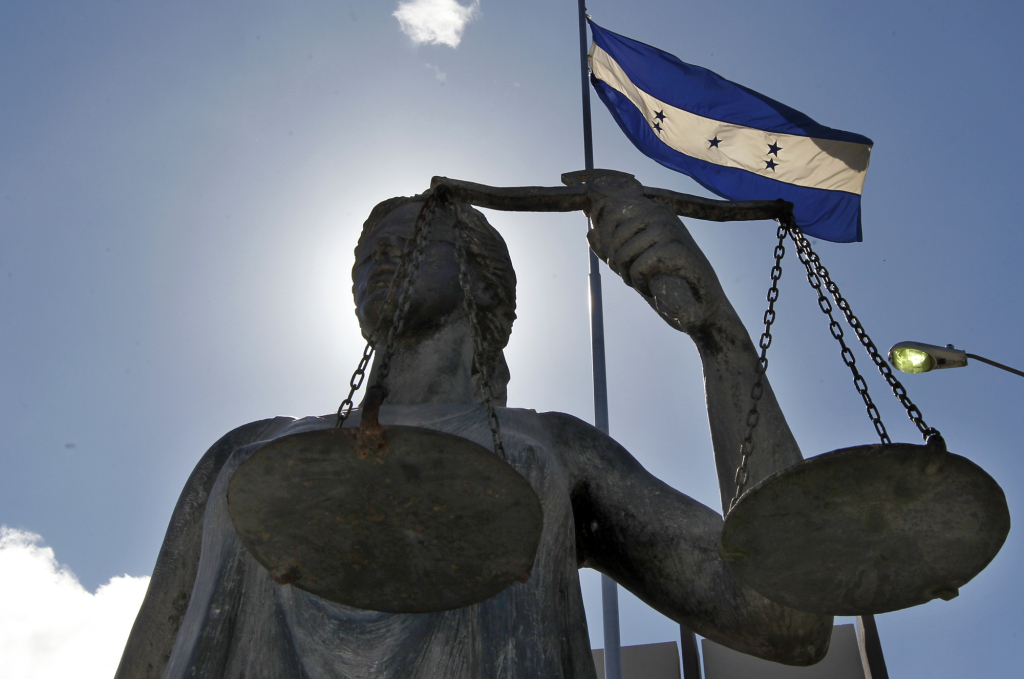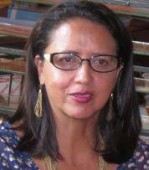Politicians, Businessmen and State Security Feed the Infiltration of Drug Trafficking in Honduras
by Dina Meza translated by Katherine Wingfield-Dobbs / March 31, 2017 / No comments

“Doña Justicia” en frente del edificio de la Corte Suprema de Honduras.
The Honduran government has been implicated in a bribery scheme with the Cachiros drug cartel. But the problem is not incidental—it is systemic. Legal and legislative reforms must be enacted.
Undoubtedly, drug trafficking in Honduras has infiltrated everything. It is a scourge with countless tentacles. Recently Devis Leonel Rivera Maradiaga, a former member of the Cachiros Cartel—a drug trafficking organization established and supported by different spheres of political, economic and state institutions—appeared in a New York court and implicated Honduran President Juan Orlando Hernandez’s family in a bribery scheme.
Many Honduran media outlets have confirmed Devis Leonel Rivera Maradiaga’s statements. Supposedly these statements stunned everyone, yet it was a well-known secret: Even the United States government–which has over the years deployed a militaristic strategy of intelligence and intervention in Honduras—knew about the corruption. Which is why we say that there is nothing new on this subject.

- Honduras has one of the world’s highest murder rates. It is also one of the most dangerous countries to practice journalism, ranking 129th out of 180 in the 2014 World Press Freedom Index. Journalists are regularly threatened, attacked, and killed for their work. The Honduran government fails to punish those who use violence against reporters, essentially granting them impunity. This space will be dedicated to examining the lack of protection for Honduran journalists exercising their profession. Topics will include the use of state-sponsored advertising as a mechanism to reward or punish publications, and censorship and self-censorship as hindrances to democratic progress.

- Born in Cofradía, Honduras, Dina Meza has been recognized by PEN International, Amnesty International, Index on Censorship and Reporters without Borders for her work as a journalist and human rights advocate. Currently, Dina is the driving force behind the creation of Honduras PEN Centre. In 2013, she wrote “Reign of Terror,” an in-depth report on threats to Honduran journalists for Index on Censorship’s magazine. In 2014, she was named one of Reporters Without Borders’ “100 Heroes and Heroines of Information.”
We now know the names of some people who are supposedly closely linked with this band of drug traffickers (which is not the only one in Honduras). Devis Leonel’s statements implicated the former President Porfirio Lobo Sosa, of the National Party and the current Security Minister, and the brother of President Juan Orlando Hernández, also of the National Party.
For several years, various parties have denounced political campaigns financed by drug trafficking in which millions of Lempira were spent on propaganda. Although there is documentation to support an investigation, enforcement bodies have ignored this information.
Drug trafficking is nourished and sustained by an intentionally paralyzed institutional framework—nothing related to the corruption is investigated. According to the denunciation by Alfredo Landaverde, former Director of the Directorate of the Fight against Drug Trafficking, “There are prosecutors, judges and police officers who have reached agreements and have received money from the drugs barons.” Landaverde was assassinated on Dec. 7, 2011 precisely because, in the months leading up to this crime, he gave statements that had been investigated in another country where justice prevails.
But how do we clean up all these areas infected by this invasive virus? We definitely cannot work with the same structures that have pus inside and an artificial outside — it is only mimicking a justice system. There are endless repercussions for the superficial system.
One minor surgery cannot get rid of all the problems that currently exist. Instead, radical reforms must be enacted to improve these critical conditions, which not only infects the political, economic, business, military and police sectors, but also the entire justice system. Change only can be achieved with the establishment of a National Constituent Assembly that is not operated by the elites who have been ruling the country for more than a century. It must be done transparently and honestly by suitable people who do not collude with corruption and impunity.
They must end the privileges of those who come to power under the assumption that they are the owners and masters of the country, which, according to them, they can sell to the highest bidder with impunity.
It would be ideal to start from scratch, to abolish laws—such as the current reforms to the Penal Code and others such as the General Mining Law—which are prejudicial to citizens and an affront to justice.
Furthermore, we must change the system of party-list proportional representation to a system of popular election. Those who do harm to citizens cannot represent the people. Instead these people must pay dearly for making a mockery of the transfer of power and using it for their own benefit.
The National Congress must change the harmful practice of nominating unsuitable people to the high positions at the Public Prosecutor’s Office, the National Commission for Human Rights (CONADEH), and the Supreme Court of Justice… After all, Honduras’ National Congress is where the economic and political elites reap the rewards of their nominations: They appoint their own people to defend their own interests.
It is imperative that they clean up the filth, and cut out the gangrene that plagues the government. Only in that way will they end the system that oppresses the Honduran people. To achieve this, citizen participation is important. Yet we must also prioritize the good of the country and not personal interests. If the latter prevails then we will have changed nothing!




